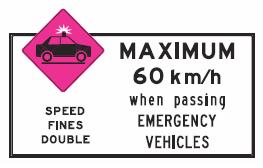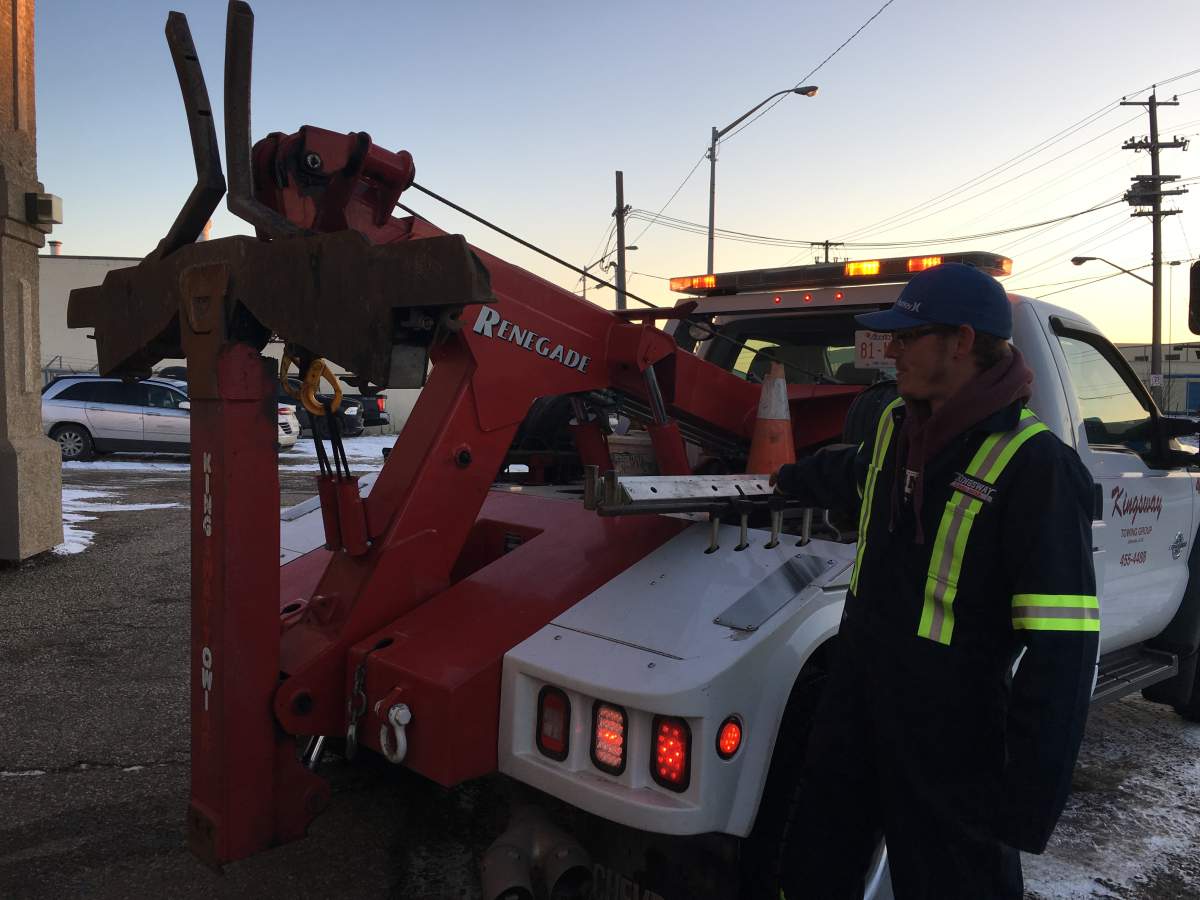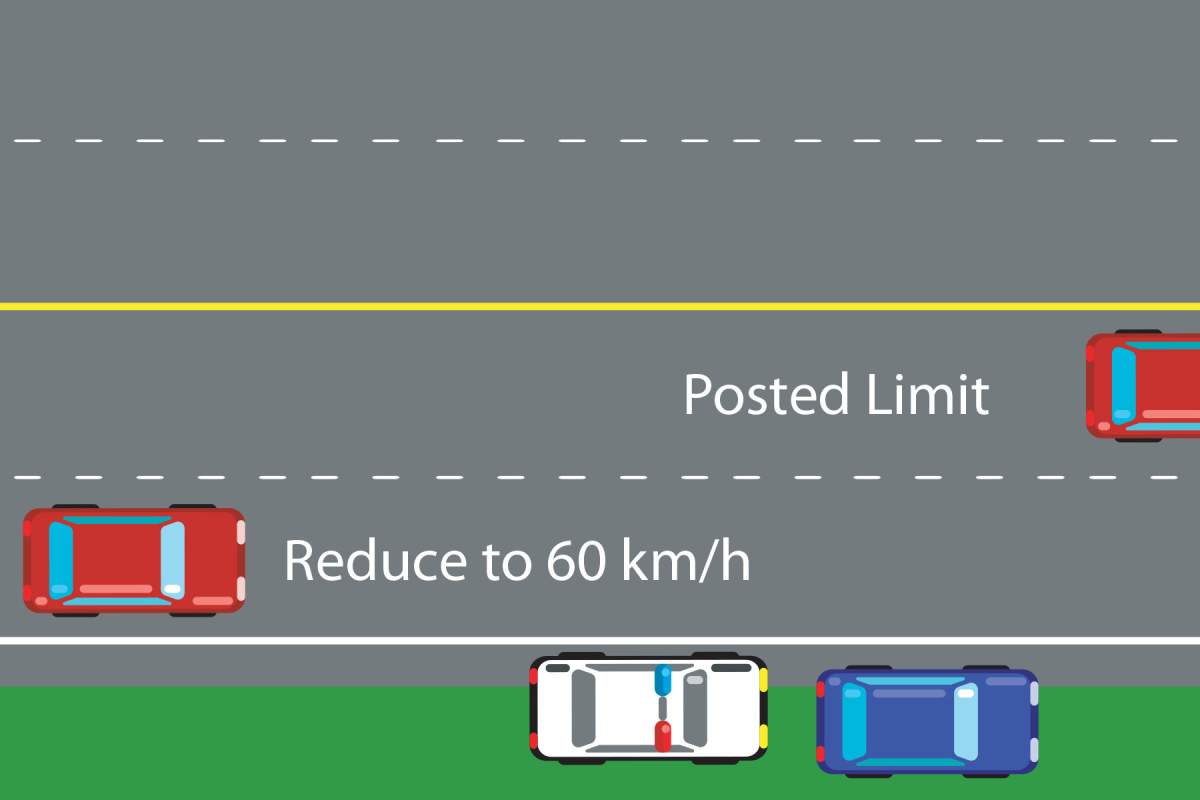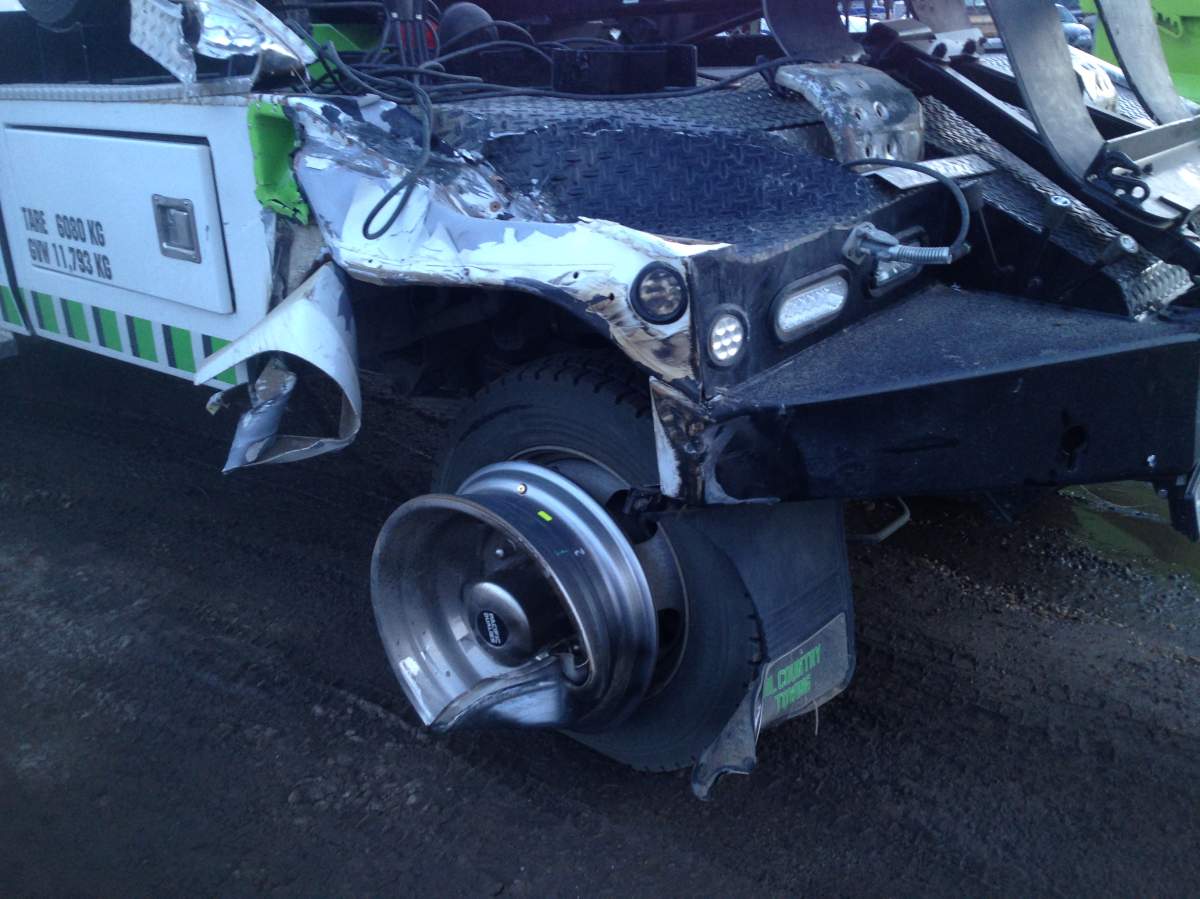At 25 years old, tow truck driver Scott Courchesne’s life flashed before his eyes while working on the side of Alberta’s Highway 16 – something that he says happens all too often in his line of work. Tow truck drivers like him are hoping a small regulation change can help keep them safe.

READ MORE: Alberta tow truck operators urge drivers to slow down and move over
It was Nov. 3 at about 6:20 a.m. when Courchesne got the call. A vehicle had collided with a deer on the Yellowhead and the driver needed a tow.
He headed to the scene and turned on his amber flashing lights in the dark. Wearing his reflective suit and vest, he started putting out orange pylons behind his truck to warn drivers that he was working on the side of the road.
He was hooking the dolly up to the damaged vehicle when he realized something was wrong.
“I heard the bang and as I’m holding the dolly bar, I look up and I see headlights coming at me,” he explained.
The metal bar he was working with blocked him from jumping into the ditch, so he acted as quickly as he could to free it.
The bar ended up wedged in the side of the oncoming SUV and Courchesne was hurt in the impact. “My neck’s all twisted, my back tissues are all torn.”
He thinks he wouldn’t have survived if he hadn’t been able to free the dolly bar.
It’s stories like this that have the Alberta Motor Association (AMA) — which represents 80 per cent of tow truck drivers in the province — pushing for changes to improve the safety of their drivers.
Since 2005, Alberta’s traffic laws require all drivers to slow to 60 km/h or slower in the adjacent lane when passing emergency vehicles — such as police cars, ambulances, fire and tow trucks — with their lights on.

Get daily National news
Traffic fines are doubled when drivers speed by an emergency vehicle or tow truck.
“Unfortunately it is far too often a reality where our tow truck operators are either in near-miss circumstances or in fact are struck. All of these circumstances are entirely preventable.” said Jeff Kasbrick, AMA’s vice-president of government and stakeholder affairs.
They believe new lights might go a long way. Right now, trucks are equipped with amber flashing lights, similar to those also used by road construction crews.
“Blue, as well as white lights, are the most visible colours when it comes to inclement weather circumstances — which is often when our roadside operators are responding.”
Each year, 37,000 of their calls — one every 15 minutes — is considered high risk. The tow truck drivers are either working along roadways with higher speeds or lots of congestion.
READ MORE: OPP blitz to target drivers who don’t slow down, move over for emergency vehicles and tow trucks
While other emergency vehicles are equipped with blue, white or red lights, the ones on tow trucks are amber — and Kasbrick worries they aren’t doing enough to slow drivers down.
“I think part of the problem we have with amber lights is that it’s everywhere. And that actually creates a bit of complacency,” he said.
Oil Country Towing covers a 50-kilometre stretch of the QEII from the edge of Wetaskiwin County to Edmonton’s city limits. Don Getschel owns the company and says he’s always worried about the safety of his drivers.
“There’s lots of distractions out there nowadays and people, when they’re coming up and approaching us — they don’t realize we’re out there working.”
On the QEII, his company uses blocker trucks to protect the crews working.
“We’ve had a couple near misses. We’ve been on scene where police cars are hit. We’ve been on scene when our own units were hit. Luckily no one was hurt but the property damage is extensive. We had one truck – it took six months to get fixed,” Getschel explained.
READ MORE: Dramatic video shows car smashing into crashed vehicle at side of Toronto highway
“We just find that people aren’t slowing down and it’s a huge problem.”
He thinks the blue lights make the tow trucks more visible to other drivers, especially in low light – and drivers need that peace of mind.
“You hear screeching tires when you’re out there working and your neck hairs stand up because they’re coming at you so fast.”
Our neighbours to the east have already made the change.
“In Saskatchewan they now have amber and blue lights in their flashing beacon for tow trucks. Unfortunately it took the death of a tow truck driver to prompt that legislative change,” Kasbrick said.
READ MORE: Blue and amber lights now allowed on Saskatchewan tow trucks
He said in Alberta, the decision wouldn’t require new legislation, because it’s a regulatory change to the Traffic Safety Act.
“This is ultimately about safety. We fundamentally believe that all Albertans have the right to be safe within their workplace, and that is even if the roadside is their office.”
Alberta Transportation Minister Brian Mason says he’s open to having discussions about new lights, but he’s worried blue might not be the right colour.
“We’d have to look at that because blue is of course the colour used by police and we don’t want to create confusion. But I think we need to remind ourselves to slow down when passing a tow truck.”
There are signs posted along Alberta highways reminding drivers of the law.

Kasbrick believes the change will eventually be made, but he said each day that passes until then leaves drivers vulnerable on the roadside.
“I’m actually not hearing opposition, it’s just making sure that we’re able to prioritize this above everything else that’s happening,” he said.
READ MORE: Emergency vehicles light up Saskatchewan highways to raise safety awareness





Comments
Want to discuss? Please read our Commenting Policy first.